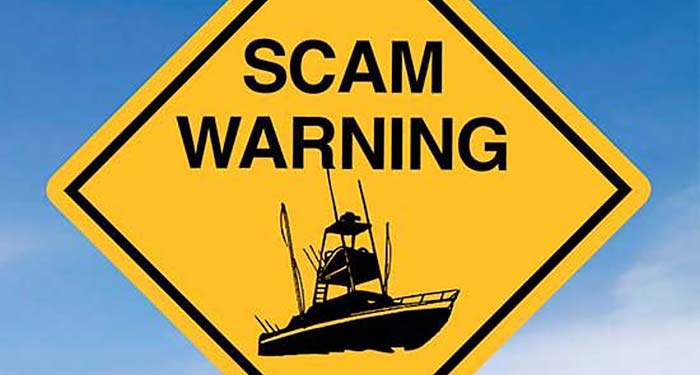Advertisement
Many of the scams we see today are variations on old tricks that have been around for decades.

BoatUS has found that the three that follow are currently in wide use when it comes to buying boats. Bottom line: If anything seems unusual, proceed with caution.
Counterfeit Cashier's Check Or Money Order
A bogus buyer will contact you with an email, offering to send a cashier's check or bank draft for the full asking price if you provide your contact information. At some point, the buyer will tell you that he/she must send you the check for significantly more than the purchase price and give you one of a number of bogus reasons why this is necessary. The buyer will then ask you to deposit the funds and send some portion of the money to someone else, often a phony shipping company. Unfortunately, the check is counterfeit, and you’ll be out the money you sent.
PayPal Variation
The phony buyer will ask for your PayPal ID in order to send you a payment, again for substantially more than the purchase price. Shortly after that, you will receive a fake confirmation from PayPal with your user ID for more than the agreed purchase price, and the buyer will contact you asking you to forward the extra money to a shipper. Again, you'll lose whatever money you've sent.
Escrow Scam
When you try to buy a boat, the seller will suggest using an escrow service and recommend something that sounds legitimate like escrowprotect.com or -googlemoney.com. But the realistic-looking website is the center of the scam: Once you transfer your money, you won't hear anything more about the boat, or the seller, ever again.
Tip
Email Fraud
Nearly all scams involve emails, and they often contain clues to alert you. Any one of the following is a warning, and two or three together should put you on high alert and make you proceed with extreme caution.
No reference to what is being sold. Scammers create a generic email to send to thousands of people, so they tend to use general language that could apply to anything. “Item,” “merchandise,” “what you are selling,” and other indefinite terms are common.
No phone contact. Scammers will go to great lengths not to talk to you and give reasons ranging from being out of the country to being in the military.
Poor grammar, spelling, punctuation, and language use. Internet scams usually originate from outside the country, and the language often appears like it wasn’t written by a native English speaker.
Many scam emails have spelling and punctuation errors. A couple in an email shouldn’t worry you, but a dozen should raise a question in your mind.
No interest in seeing the boat or haggling over the price. Whether buying or selling, scammers are amazingly unconcerned about the price of the boat. Who wouldn’t negotiate? And if buying, they’ll often say they accept the boat “as-is,” won’t mention a survey or inspection, and won’t hold you responsible for its condition. Anyone willing to buy a boat sight unseen after a few emails should be regarded with suspicion – and if they’re also not concerned about price, it’s a good bet you’re being scammed.
If you’re considering buying a boat, scammers will price the boat cheaply, but despite a plethora of pictures and a good description (likely swiped from a real ad), the boat doesn’t exist. If a boat you’re seriously interested in is out of state, send a local accredited marine surveyor or someone you trust to verify there really is a boat and that the seller has the actual title and registration. Once you’re satisfied that the boat is real and paperwork legit, you can arrange for a survey and proceed from there.
Cobbled-together email addresses. Scammers constantly change their email addresses to avoid detection, and they may have to get ones with fairly normal-looking names but lots of numbers.
Demands to use a specific business (escrow or shipper) and won’t accept an alternate. If you chose to use an escrow service to settle the transaction, suggest your own after visiting the BBB site and verifying it’s a legitimate one.
Changing names and locations in emails. It can be difficult to keep the details straight when scammers are working multiple scams. If the person doesn’t remember who or where he is supposed to be, or exactly what he’s buying, you’re being scammed.
Wants to pay a different amount from the selling price. If any mention is made of paying you anything more than the agreed price, walk away.
No concern over title/documents. If there’s no interest in discussing titling the vessel or in verifying the registration information or hull-identification number, the person has no real interest in the transaction.
